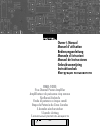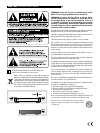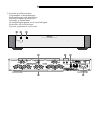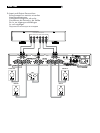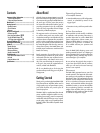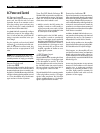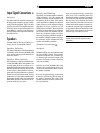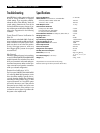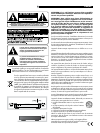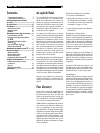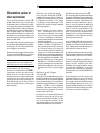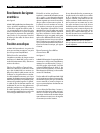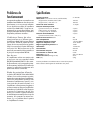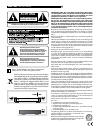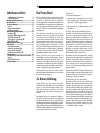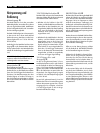
6
RMB-1085 Five-Channel Power Amplifier
AC Power and Control
AC Power Input
The RMB-1085 is supplied with the proper AC
power cord. Use only this cord or an exact
equivalent. Do not use an extension cord. A
heavy duty multi-tap power outlet strip may
be used, but only if it is rated to handle the
current demand of the RMB-1085.
Your RMB-1085 will automatically configure
itself for the proper AC line voltage rating,
from 110 volts to 240 volts, at 50/60Hz. No
setting is required to match the unit to your
local voltage.
Plug the supplied cord into the AC INPUT
receptacle
on the back panel of the unit.
After all connections have been made, plug
the other end into an appropriate AC wall
outlet.
NOTE: If you are going to be away from
home for an extended period of time, it is a
sensible precaution to unplug your amplifier.
Power Switch and
Indicator
The Power Switch is located on the front panel.
To turn the amplifier on (or to activate either of
the optional automatic power-on modes), push
the switch in. The LED indicator above the switch
will light, indicating that the amplifier is turned
on. To turn the amplifier off, push the button
again and return it to the out position.
Turn On/Off Mode Selector
The RMB-1085 can be turned on and off manu-
ally, or automatically by using its “12V Trigger”
ÃÞÃÌi°Ê/iÊ/ÕÀÊ"É/ÕÀÊ"vvÊ`iÊÃiiVÌÀÊ
switch selects which method is used.
UÊ 7ÌÊÌiÊÃÜÌVÊÊÌiÊ"Ê«ÃÌ]ÊÌiÊ
amplifier is turned on or off manually us-
ing the front panel power switch. Use this
mode if you are using a switched AC outlet
to control power to the amplifier.
UÊ 7ÌÊÌiÊÃÜÌVÊÊÌiÊ£Ó6Ê/,°Ê«ÃÌ]Ê
the amplifier is turned on automatically
when a 12 volt trigger signal is applied to
ÌiÊΰxÊ>VÊ>Lii`Ê °Ê/iÊvÀÌÊ«>iÊ
*"7,Ê-7/ÊÛiÀÀ`iÃÊÌÃÊvÕVÌ°ÊÌÊ
ÕÃÌÊLiÊ" ÊvÀÊÌiʳ£Ó6ÊÌÀ}}iÀÊÌÊÜÀ°Ê
/ÕÀ}ÊÌiÊÃÜÌVÊ"ÊVÕÌÃÊ«ÜiÀÊÌÊÌiÊ
amplifier, regardless of whether or not a
trigger signal is present.
+12V Trigger Input
and Output
/iÊ>VÊ>Lii`Ê ÊÃÊvÀÊViVÌ}ÊÌiÊΰxÊ
*Õ}É>LiÊV>ÀÀÞ}Ê>ʳ£ÓÊÛÌÊÌÀ}}iÀÊÃ}>Ê
to turn the amplifier on and off. To use this
vi>ÌÕÀiÊÌiÊ>`>ViÌÊÃÜÌVÊÕÃÌÊLiÊ«>Vi`ÊÌÊ
the 12V TRIG position (see previous section).
This input accepts any control signal (AC or
DC) ranging from 3 volts to 30 volts.
/iÊ>VÊ>Lii`Ê"1/ÊÃÊvÀÊViVÌ}Ê>ÌiÀÊ
3.5mm plug/cable to provide a 12V trigger
signal to other components. The 12V output
Ã}>ÊÃÊ>Û>>LiÊÜiiÛiÀÊ>ʳ£ÓÊÛÌÊÌÀ}}iÀÊ
signal is applied to the IN connector.
Protection Indicator
Thermal and protection circuits protect the am-
plifier against potential damage in the event of
extreme or faulty operating conditions. Unlike
many designs, the RMB-1085’s protection cir-
cuit is independent of the audio signal and has
no impact on sonic performance. Instead, the
protection circuit monitors the temperature of
the output devices and shuts down the amplifier
if safe limits are exceeded.
In addition, the RMB-1085 includes over-cur-
rent protection which operates only when load
impedances drop too low. This protection is
independent for each of the five channels .
Should a faulty condition arise, the amplifier
V>iÊ>ÌÊv>ÕÌÊÜÊÃÌ«Ê«>Þ}Ê>`ÊÌiÊ*,"-
//" ÊÊÊÌiÊvÀÌÊ«>iÊÜÊ}Ì°Ê
If this happens, turn the amplifier off, let it
cool down for several minutes, and attempt to
identify and correct the problem. When you
turn the amplifier back on, the protection circuit
ÜÊ>ÕÌ>ÌV>ÞÊÀiÃiÌÊ>`ÊÌiÊ*,"//" Ê
LED should go out.
In most cases, the protection circuitry activates
because of a fault condition such as shorted
speaker wires, or inadequate ventilation
leading to an overheating condition. In very
rare cases, highly reactive or extremely low
impedance speaker loads could cause the
protection circuit to engage.



